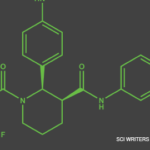
Dr. Jayne
Dr. Jayne served as one of the investigators in the CLEAR trial, a phase 2 study of avacopan in 67 patients.3 He points out that, partly because of regulatory obstacles, many rheumatology studies have simply added a study drug to standard-of-care therapies, offering no opportunity to demonstrate steroid-sparing effects. But in this phase 2 study, researchers progressively replaced steroids in three phases—eventually going down to no steroids at all—with each stage approved by an independent data monitoring committee. The results demonstrated avacopan’s promise as a steroid-sparing agent.
ADVOCATE Trial
Like the phase 2 trial, the phase 3 trial was set up to demonstrate avacopan’s potential to replace glucocorticoids for ANCA-associated vasculitis.1
Design
Participants were diagnosed with either granulomatosis with polyangiitis or microscopic polyangiitis, two forms of ANCA-associated vasculitis, in accordance with the International Chapel Hill Consensus Conference definitions.4 Ultimately, 331 patients with new or relapsing disease were enrolled from 143 different international centers.
The randomized controlled trial was designed to be both double blind and double dummy. Thus, 166 participants were assigned to receive 30 mg avacopan twice a day orally, with a prednisone placebo, for 12 months. The other half of the participants received oral prednisone in a tapering regimen down to zero at five months, with an avacopan placebo.
Additionally, patients received immunosuppressive treatment, either cyclophosphamide or rituximab, at the discretion of the prescribing physician, as would commonly be done outside of a study setting. No rituximab was given after week 4. To better compare the results of those receiving avacopan vs. prednisone, the researchers reviewed several factors, including whether the patient received cyclophosphamide or rituximab.
Complicating the study design is the fact that many participants were already receiving glucocorticoids as part of their treatment. In a real-world setting, such patients are usually placed on these drugs immediately to help get their disease under control.
Thus, open-label prednisone treatment continued to be tapered for the early part of the trial in both groups. Open-label prednisone had to be tapered to 20 mg or less of prednisone daily before beginning the trial, in both treatment groups. Further, any open-label glucocorticoids had to be completely tapered off by the end of week 4 of the trial, in both groups.
‘50% of patients still have signs of nephritis at six months on high-dose steroids & rituximab.’ —Dr. Jayne
Results
At week 26, 72% of participants in the avacopan group were in remission, as were 70% of patients in the prednisone group (P=0.24 for superiority at week 26; so did not meet significance). At the study’s conclusion at week 52, 66% of patients in the avacopan group were in sustained remission, as were 55% of those in the prednisone group (P<0.001 for noninferiority at week 52). Thus, in terms of remission, avacopan was neither better nor worse than glucocorticoids at week 26, but superior to glucocorticoids at week 52 (P<0.001 for noninferiority at week 26; P=0.007 for superiority at week 52).
Over 80% of the participants had renal vasculitis. Avacopan also demonstrated potential beneficial effects on renal disease, with improvements in estimated glomerular filtration rate and albuminuria. These improvements were most marked in individuals with the lowest glomerular filtration rate (i.e., patients with stage 4 kidney disease). More severe stage 5 patients were excluded from the study.
Patients in the avacopan group experienced fewer side effects and adverse events related to prednisone exposure, as assessed by the Glucocorticoid Toxicity Index score.5
The rate of serious adverse events related to vasculitis worsening was similar between the two groups, with no prominent safety signal appearing for avacopan. Reassuringly, no participants experienced infections with Neisseria meningitidis. Because C5b is needed to form the terminal complement complex critical for Neisseria protection, such infections are a concern for other types of complement inhibitors, such as eculizumab, that block both C5a and C5b, and not just C5a (e.g., avacopan).



